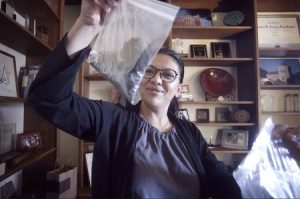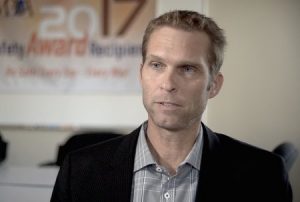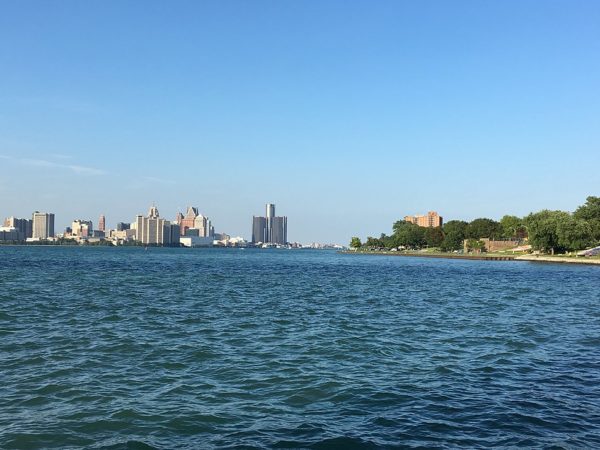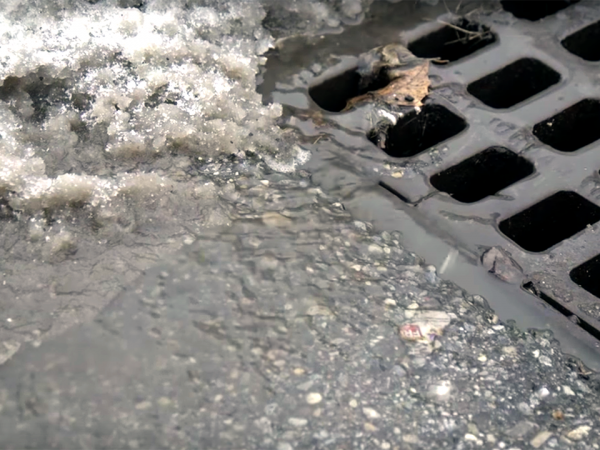
The Motor City finds ‘political will’ for cleaner air
The story starts in 2013, when residents living in Windsor, Ontario in Canada noticed big black piles of some kind of material along the Detroit shoreline south of downtown.

A truck arrives with more petcoke on Detroit’s waterfront in 2013. Photo courtesy Stephen Boyle, FuzzyTek Images
It turned out to be petroleum coke, or petcoke, a byproduct Canadian tar sands oil processed at the Marathon refinery in Southwest Detroit.
The mountains of petcoke had been trucked in to be loaded onto freighters.
Petcoke is used as a fuel, much of it exported and burned like coal in China and India.
Doug Hayes of the Canadian environmental group Windsor on Watch heard from a woman who lived in a riverfront apartment building complaining about black dust. Hayes said, “When we saw these piles we knew exactly what this was on this woman’s balcony.”
Then Hayes’ colleague Randy Emerson caused a stir with his phone camera.
Emerson happened to capture video when a gust of wind grabbed petcoke dust from the piles that covered the sky over the Detroit River. “The wind shifted,” Emerson said, “and that cloud actually came down downtown Windsor here.”
The video went viral.
Meanwhile, then Michigan State Representative Rashida Tlaib heard about petcoke dust problems on the U.S. side and checked with state officials to see if it was harmful. “What we were told by Michigan Department of Environmental Quality was ‘sorry, it’s not toxic,’” she said.

Former Michigan State Representative Rashida Tlaib with her petcoke samples in ziplock bags Photo by Bill Kubota
The MDEQ had determined the petcoke did not pose a cancer-causing risk, so Tlaib gathered her own samples for chemical analysis.
Tlaib’s independent lab testing revealed her samples contained compounds including vanadium and selenium. The MDEQ would then say exposure to petcoke dust as with other airborne particulates could lead to respiratory and cardiovascular problems.
Soon after, Detroit mayor Dave Bing stepped in and the petcoke piles were gone from the waterfront.
Around that time, Chicagoans saw petcoke make an appearance there. Windblown piles had been stacked along the Calumet River in the southeast part of the city, coming from a British Petroleum refinery just over the border in Indiana.
The city of Chicago quickly enacted an ordinance requiring petcoke be covered to control the dust.
Not so in Michigan, where at state capitol in Lansing, Tlaib, a Democrat, had taken the issue the state legislature. Tlaib said, “All the experts I talked to, people in California, even in India, they all say you have to contain it in some sort of enclosed area.”
Tlaib’s petcoke enclosure bill went nowhere. Although she had some bipartisan support from Detroit area legislators, in a state where the Governor and both houses have Republican majorities, the bill had little chance for success.
At the same time, Raquel Castañeda-López campaigned for a seat on the Detroit City Council, learning about the dust firsthand.
“I literally was door knocking in that neighborhood when it was happening,” Castañeda-López said, “I remember people saying they could see the film, wipe their fingers along the sills and you would see this type of fine powder along their windows.”
Castañeda-López won the election and immediately started working her own petcoke ordinance.
It took four years.
In late October 2017, Detroit City Council passed its fugitive dust ordinance by a vote of 7-2. “I’ve learned a lot about how long change takes,” Castañeda-López said, “especially when you are kind of pushing people outside their comfort zone.”

Detroit City Councilmember Raquel Castañeda-López spent four years getting the fugitive dust ordinance enacted Image by Bill Kubota
Castañeda-López said pushback came from business and labor leaders, and from the companies directly affected. She said they were all concerned about how it would hurt the economy and chase away jobs.
“Unfortunately there is a resistance and that industry just doesn’t want to be regulated,” Castañeda-López said, “so many times it’s just no, we should be exempt and we don’t think this is necessary.”
While the ordinance requires petcoke and other coke-like materials to be held in enclosures, the law goes further, more closely inspecting other possible fugitive dust sources from bulk storage facilities holding materials, which are mostly used in construction and roadbuilding.
The Michigan Aggregates Association, which represents bulk storage operations across the state, opposed the ordinance.
“This is precedent setting,” said Douglas Needham, who leads that group.

Douglas Needham of the Michigan Aggregates Association said the ordinance will be a burden for the bulk storage operators he represents Image by Bill Kubota
Needham said he appreciates the intent of the ordinance, but it’s an added burden on bulk storage operators. “We are an industry that is currently very heavily regulated,” Needham said, “so this ordinance adds another layer of bureaucracy to that.”
The aggregates typically go into construction and roadbuilding. “We look at it like beach sand,” Needham said. “The finest particles really are about as small as it comes on a beach. So although it may blow from the top of the pile to the side of the pile it is not it is not a particulate that is going to become airborne and float throughout the city.”
According to Castañeda-López, the ordinance has been extensively researched. She said there had been discussion with stakeholders, including bulk storage facilities, the Michigan Aggregates Association, environmental groups, the MDEQ and the U.S. Environmental Protection Agency.
Castañeda-López also consulted with Marathon Petroleum to see how the refinery dealt with the petcoke. She said, “We actually worked with them when we were drafting this legislation to make sure that we learned from their wisdom, actually, in handling those materials.”

Law Professor Peter Hammer of Wayne State University’s Damon J Keith Center for Civil Rights calls the ordinance “common sense regulation”
Photo courtesy Wayne State University
Law professor Peter Hammer, director of the Damon J. Keith Center for Civil Rights at Detroit’s Wayne State University, sees ordinance as “common sense regulation,” something he’s been waiting to see in recent years as Detroit has focused on supporting industry and its tax base as it emerged from bankruptcy.
He said, “Because of the lack of political will, this is the first time an effective coalition has come together and produced a victory.”
Regarding the impact to local industry, Hammer takes an another view. “You really have to ask what kind of economic development is going to happen in the neighborhoods,” he said, “There is a real danger that the kind of economic development you will attract will indeed be those that are the most polluting.”
“I think it’s a first step in the city,” said Castañeda-López. “It’s kind of changing the trajectory from solely relying on heavy industry to support our local economy and really towards diversifying the local economy.”
Castañeda-López adds, “if we want to attract families to the city, if we want to make this a thriving city, and people are coming and feeling sick, or being impacted by that type of industry, it’s just not going to work out.”
1 Comment
-
This blog gave me so much knowledge about petcoke and many other things like that. Thanks for this help .




